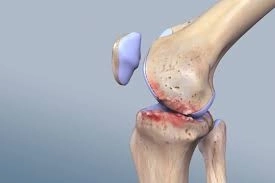
The Difference Between Knee Osteoarthritis and Arthritis: Diagnosis and Treatment
Published on: 2025-06-14 | Written by: Dr. Ahmed Mustafa Abdel Moneim, Orthopedic and Fracture Surgery
Many people confuse knee osteoarthritis with arthritis, although both cause knee pain and affect daily movement. However, the cause, nature of the disease, and treatment options differ. In this article, Dr. Ahmed Mostafa Abdel Moneim explains the key differences between knee osteoarthritis and arthritis, their causes, diagnostic methods, and effective treatment approaches.
What is Knee Osteoarthritis?
Knee osteoarthritis is a chronic degenerative condition resulting from the gradual wearing away of the cartilage that cushions the ends of the bones in the joint. Over time, joint flexibility decreases, and the synovial fluid diminishes, leading to bone-on-bone friction.
Common Symptoms:
-
Pain during movement or prolonged standing
-
Crackling or popping sounds when moving the knee
-
Difficulty climbing stairs
-
Morning stiffness
-
Mild swelling at times
Causes:
-
Aging
-
Excess body weight
-
Previous injuries
-
Genetic predisposition
-
Overuse of the joint
What is Arthritis?
Arthritis is a general term for conditions involving inflammation of the joints, with various types, most notably:
-
Rheumatoid Arthritis
-
Psoriatic Arthritis
-
Gout
Common Symptoms:
-
Persistent and severe joint pain
-
Redness and warmth around the joint
-
Noticeable swelling
-
Morning stiffness lasting over 30 minutes
-
Systemic symptoms like fever and fatigue (especially with autoimmune types)
Causes:
-
Autoimmune disorders
-
Viral or bacterial infections
-
Metabolic disorders (such as gout)
-
Genetic factors
Key Differences Between the Two Conditions
| Criteria | Knee Osteoarthritis | Arthritis |
|---|---|---|
| Nature | Degenerative (cartilage wear) | Inflammatory (autoimmune/infectious) |
| Typical Age Group | Common in people over 50 | Can appear at younger ages |
| Systemic Symptoms | Rarely involves fever or fatigue | Often includes fever and general fatigue |
| Lab Tests | Usually normal | May show inflammatory markers in blood |
| Treatment Response | Improves with movement & physiotherapy | Requires anti-inflammatory or immunosuppressive drugs |
Diagnosis
Dr. Ahmed Mostafa Abdel Moneim emphasizes that accurate diagnosis starts with a thorough clinical evaluation and may include:
-
X-rays of the knee
-
Blood tests (especially in suspected inflammatory arthritis)
-
MRI in some cases
-
Joint fluid analysis when needed
Treatment Options
✅ For Knee Osteoarthritis:
-
Weight management
-
Physiotherapy sessions
-
Supplements (e.g., glucosamine)
-
Injections (PRP or hyaluronic acid)
-
Surgery in advanced cases (such as knee replacement)
✅ For Arthritis:
-
Anti-inflammatory medications
-
Immunomodulatory drugs (for rheumatoid arthritis)
-
Uric acid-lowering medications (for gout)
-
Physical therapy to maintain joint function

